The sixth Global Vertical Farming Show in Dubai closed on a pragmatic note. The exhibition floor still pulsed with demos and crowded booths, but the conversations that spilled into panels and side meetings focused on discipline: profitability framed as engineering, distribution as core strategy, and governance as the system that can accelerate or stall progress.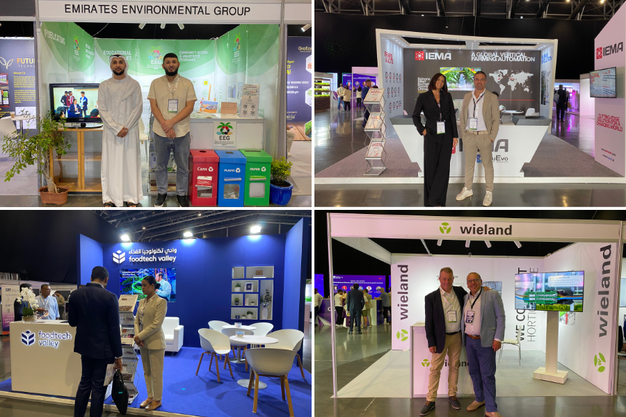 © Wesley Francis | FreshPlaza.com
© Wesley Francis | FreshPlaza.com
View the Photo report: Global Vertical Farming Show 2025 here.
Energy math, modeled from day one
Across sessions, speakers agreed that in the Gulf, electricity pricing is the defining pressure point for vertical farms. The takeaway was to model energy as an integrated system rather than a single line item, thinking in terms of centralized chillers, waste-heat capture for dehumidification, and carbon reuse, not just lighting loads. Several speakers said cooling systems are among the largest capital costs in new builds.
In his individual talk, Derek Oxford, CEO of Total Grow Control, argued that treating energy as a plant-wide design problem pays off: a centralized setup with gas-driven chillers, using combustion heat for dehumidification and routing captured carbon back into the farm, can cut total energy use by up to 50% but only if it's modeled and engineered up front.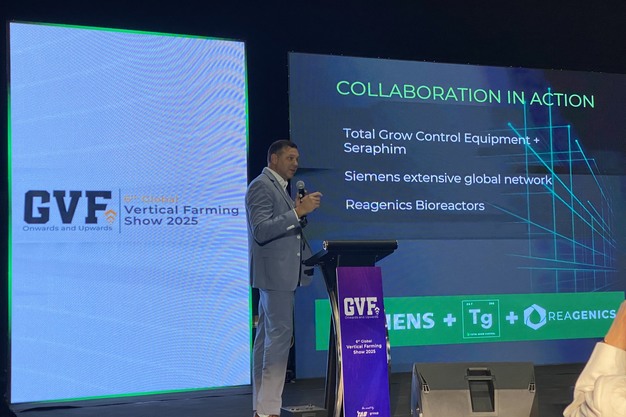 © Wesley Francis | FreshPlaza.com
© Wesley Francis | FreshPlaza.com
Derek Oxford, CEO and Founder of Total Grow Control, presented the company's collaborative innovations and partnerships.
View the Photo report: Global Vertical Farming Show 2025 here.
Automation and retrofits move from "nice-to-have" to default
On the product side, retrofit-friendly automation drew sharp interest. Ying Hau, COO of Trolmaster, said, "The company earned its reputation in the United States as the gold standard of climate control," emphasizing compatibility with 80 to 90% of existing equipment so growers don't have to rip and replace to modernize.
He highlighted Aqua-X irrigation controls that can connect up to 600 pumps or valves, and the Aero-Fan, a DC fan that adjusts in 1% increments in response to humidity, temperature, or VPD, features that have helped clients reduce electricity bills. The mission, Hau said, is "making smart automation affordable for everyone."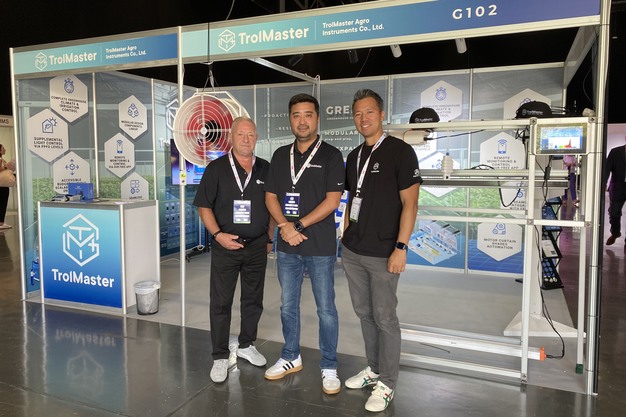 © Wesley Francis | FreshPlaza.com
© Wesley Francis | FreshPlaza.com
Trolmaster's Angelo Abed, Jason Chan, and Ying Hau demonstrated solutions designed to optimize controlled environment agriculture across both greenhouse and vertical farm settings.
View the Photo report: Global Vertical Farming Show 2025 here.
Digital integration becomes table stakes
Global automation firm Körber, better known in pharma and logistics, made the case that vertical farms must run on real-time data. "Real-time monitoring, early fault detection, and data-driven insights let farmers focus on growing, not troubleshooting," said Jonathan Laperdrix, Global Sales Account Manager.
He cited a retrofit in Kuwait that now runs fully automated, with more than 500 kilograms of leafy greens per day and "no human intervention except for harvesting and packaging." Körber's pitch: connect what you already have; don't start from zero.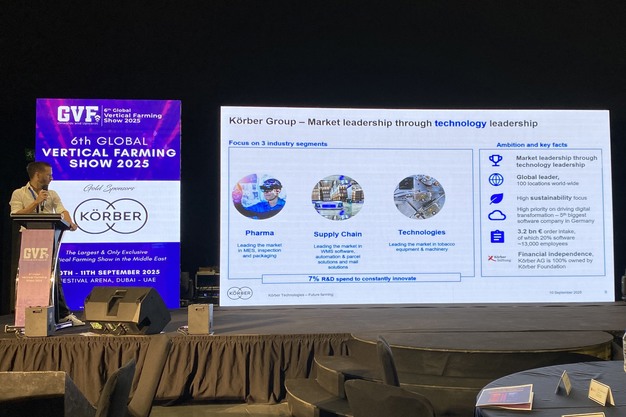 © Wesley Francis | FreshPlaza.com
© Wesley Francis | FreshPlaza.com
Jonathan Laperdrix of Korber Technologies GmbH is highlighting the company's automation and technology portfolio across pharma, supply chain, and agtech applications.
View the Photo report: Global Vertical Farming Show 2025 here.
Investment climate: Caution with capital
The investment backdrop was never far from view. Several panelists acknowledged that the wave of failures in North America and Europe has made it harder to convince financiers that vertical farming is more than a capital sink.
Sky Kurtz of Pure Harvest Smart Farms noted that billions in global investment had been "wiped out" by ventures that scaled before proving unit economics, a legacy that now complicates fundraising even for profitable operators. Investors, speakers said, want evidence that farms can generate cash on a repeatable basis, not just technical proofs of concept. That reality is pushing companies toward measured expansion, stronger offtake agreements, and incremental retrofits over greenfield mega-projects.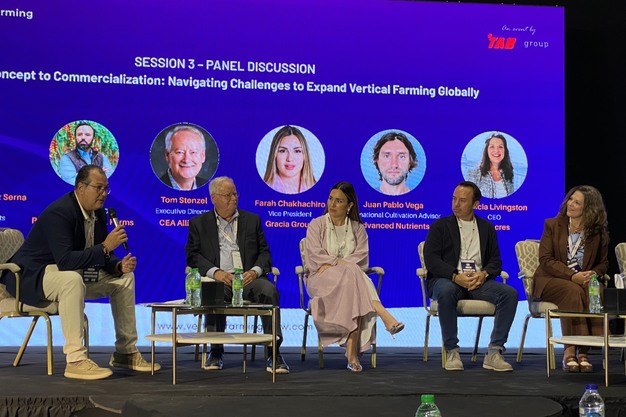 © Wesley Francis | FreshPlaza.com
© Wesley Francis | FreshPlaza.com
Interesting insights and advice arose from the panel discussion "From Concept to Commercialization", featuring Sky Kurtz (Pure Harvest), Tom Stenzel (CEA Alliance), Farah Chakhachiro (Gracia Group), Juan Pablo Vega (Advanced Nutrients), and Patricia Livingston (80 Acres), discussing how to create and scale profitable vertical farms.
View the Photo report: Global Vertical Farming Show 2025 here.
Gulf-specific strategies, not one-size-fits-all
Speakers also stressed that Gulf economies differ from Europe or the U.S. Persistent price pressure from imports means local farms must differentiate on freshness, food safety, and reliability, but only with unit economics that work.
That is pushing more operators to pair farms with downstream infrastructure like cold storage, packhouses, and distribution, and to align output with local consumption patterns. Government-linked hubs such as the Abu Dhabi Food Hub were cited as enablers for newer entrants navigating procurement, logistics, and retail access.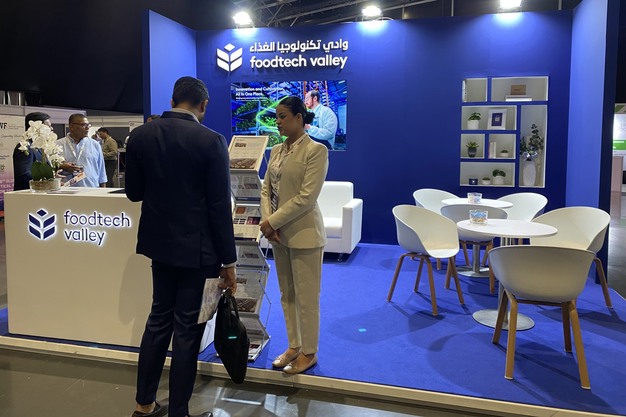 © Wesley Francis | FreshPlaza.com
© Wesley Francis | FreshPlaza.com
Hostesses welcomed visitors to Food Tech Valley's stand, which highlighted Dubai's innovation ecosystem for agrifood technologies.
View the Photo report: Global Vertical Farming Show 2025 here.
The next phase: Engineered for reality
By the end of two days, it was clear that the sector has no shortage of prototypes or ambition, but the next wins will come from farms that measure twice before cutting once, standardize what works, and build only against real demand.
Ra'ed M. Ben Shams, Advisor at Bahrain's Ministry of Cabinet Affairs, said, "The question isn't whether the technology exists, but whether governance can evolve quickly enough to orchestrate transformation."
For more information:
Global Vertical Farming Show
[email protected]
www.verticalfarmingshow.com
